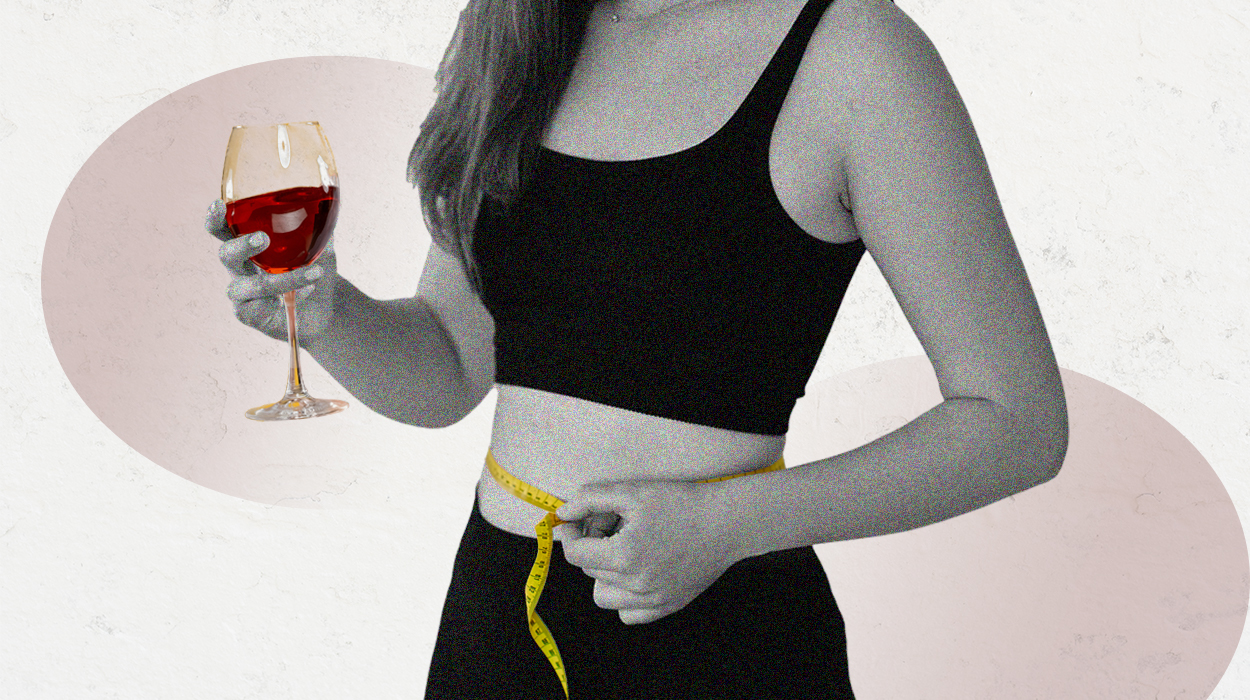 Expert's opinion
Expert's opinion
Expert's opinion
The article is a subjective view on this topic written by writers specializing in medical writing.
It may reflect on a personal journey surrounding struggles with an illness or medical condition, involve product comparisons, diet considerations, or other health-related opinions.
Although the view is entirely that of the writer, it is based on academic experiences and scientific research they have conducted; it is fact-checked by a team of degreed medical experts, and validated by sources attached to the article.
The numbers in parenthesis (1,2,3) will take you to clickable links to related scientific papers.
Is Wine Good For Weight Loss? – Benefits Of Red Wine 2024

For years, there have been headlines that answer the question “Is wine good for weight loss?”. While this sounds too good to be true, there may be a grain of truth to the claim. One of the studies on drinking wine and losing weight showed that a plant compound found in grapes, resveratrol, can change white fat,[1] cells into beige fat cells. Another study,[2] conducted by the Harvard School of Medicine on 20,000 women showed women who drank wine moderately reduced their risk of developing obesity by 70%. According to that, here are the benefits of drinking wine for a weight loss journey as well as health effects.
Is Wine Good For Weight Loss?
In addition to a balanced diet and a consistent exercise routine, weight loss can be achieved by drinking wine. Some studies have suggested drinking wine, especially before going to bed, may help you achieve your weight loss goals. Some research suggests that a plant compound found in grapes, resveratrol, can change white fat cells into beige fat cells.
To reap the full benefits of your glass of red wine, stick to one serving which is one glass or 5 ounces (150 ml). Keep track of your calories as well, so you know how many calories you’ve consumed in one day.
Drinking Wine For Weight Loss Or Weight Gain
A diet rich in antioxidants can help you slow damage to your cells caused by free radicals and reduce your risk of developing various diseases. Some antioxidants such as thymoquinone found in cumin, quercetin found in massive amounts in buckwheat tea, and resveratrol found in wine has numerous health benefits and are now showing promise in helping promote weight loss.
However, wine can also be loaded with sugar and calories, leading to the debate on whether wine can help you lose weight. While different variations of wine have different amounts of alcohol, sugar, and calorie content, most of its calories come from alcohol. Wine contains resveratrol and other antioxidants with anti-inflammatory properties that can help your body increase heart health, and control blood sugar. Some human studies,[3] have shown moderate wine consumption can also keep you from gaining weight. Drinking moderate amounts of wine can also improve blood flow because it relaxes your blood vessels, increasing the number of nutrients your cells get along with oxygen, a necessary component in burning fat.
In addition, wine consumption increases two hormones that help you build muscle and burn fat, respectively: testosterone and adiponectin. Not just that, it also decreases estrogen production, the hormone that makes you retain fat, and serum hormone-binding globulin (SHBG), which prevents testosterone in your body from acting on receptors. The increase in testosterone and adiponectin coupled with the decrease in estrogen and SHBG helps release stored fat and increases your metabolism. However, excessive alcohol consumption, especially in men, leads to weight gain. Overconsumption of alcohol can also lead to problems in regulating blood sugar levels and insulin resistance.
How Does Wine Help You Lose Weight?
White fat cells are found in connective tissues as visceral fat and subcutaneous fat and convert excess calories into fatty acids. Too many white fat cells,[4] in your body not only make you gain weight but also lead to an imbalance and disease. Brown fat cells burn energy,[5] to help your body produce heat when your body’s temperature drops. However, Beige fat cells are found in areas where white cells are (beneath the skin and abdominal cavity) but act like brown fat cells.
According to that, grapes in wine have a plant compound, resveratrol, that can change white fat cells into beige fat cells. In addition, Beige fat cells are transformed from white fat cells through regular exposure to temperatures above the shivering point for at least two hours, regular exercise, and intake of nutritional supplements such as quercetin and CBD. Brown fat cells not only encourage weight loss but also reduce your risk of hypothermia and increase your body’s insulin sensitivity, therefore lowering your chances of developing diabetes. This means your ability to turn white fat cells into beige cells can help you lose weight,[6] and partially prevent obesity.

There is a fine line between overconsumption and moderation when it comes to drinking wine. To minimize overindulging and get the maximum benefits from your glass of wine, stick to one serving which is one glass or 5 ounces (150 ml). Keep track of your calories as well, so you know how many calories you’ve consumed in one day.
What Are The Health Other Benefits Of Drinking Wine?
There has been much debate on the health benefits of drinking wine. However, more and more studies seem to support the idea that drinking a moderate amount of wine can reduce the risks of various diseases.
Red wine is high in antioxidants, especially resveratrol, which can reduce your risk of coronary heart disease, reduce high blood pressure, and keep your blood sugar levels stable. Remember, the way to lose weight is to consume fewer calories than what your body uses. When drinking wine, stick to dry red wine, which is healthier than white wine and sweet wines because they have more antioxidants and less residual sugar.

Here are a few of the known benefits of drinking red wine:
- Good for your heart: The antioxidants,[7] contained in wine help decrease your risk of developing coronary artery disease. Your risk of heart attack increases with coronary artery disease. While not completely understood, this might be because these antioxidants protect against bad cholesterol buildup, increase good cholesterol levels, and help with heart disease and cancer.
- Lowers blood pressure: Experimental studies showed that dealcoholized wine increases the level of nitric oxide,[8] in the body, which helps blood vessels relax, therefore reducing high blood pressure.
- Reduces insulin resistance: Another study showed the beneficial effects of wine on insulin resistance,[9]. This study took sixty-seven men with a high risk of cardiovascular disease and let them drink red wine and dealcoholized red wine and gin in the same amounts. The study found fasting glucose was constant throughout the study, and plasma insulin and HOMA-IR, an indicator of insulin resistance, decreased after giving red wine and dealcoholized red wine to the participants.
Best Wine For Weight Loss
If you’re looking to take full advantage of the antioxidants available in wine, drinking red wine is the best choice over white. Red wine,[10] contains more antioxidants than white wines because red wine includes grape skins, which have antioxidants during fermentation.
Opt for dry red wines instead of sweet ones because the sweeter wines can contain more sugar than dry wines. It can be difficult at times to determine if a wine is dry or sweet if you base it on how it tastes, but a wine that has fewer than 10 grams of residual sugar is categorized as dry, and a wine that has over 35 grams of residual sugar is considered sweet.
For red wines, choose rosé, pinot noir, or merlot. These only have 1 gram of sugar, 3 grams of carbohydrates, and 88 calories per five ounces (one glass). Steer clear of sherry and marsala, which have 8 grams of sugar, 14 grams of carbohydrates, and 164 calories in one glass.
But the most crucial tip to keep in mind is to drink in moderation, that’s one glass for women, one to two glasses for men. If you plan on consuming wine, make sure you are still at a calorie intake deficit to keep your weight loss on track.
Conclusion
For decades we all thought that we shouldn’t drink if we wanted to lose weight because of the belief that it merely contains empty calories and causes us to overeat. This is why it seems too good to be true that there are now studies that prove otherwise and show that there may be multiple health benefits to moderate quantity consumption of wine, including weight loss. Accordingly, you need to find out how much wine a day is suitable for your health. A balanced diet and a consistent exercise routine with drinking wine daily will help you increase your longevity.
+ 10 sources
Health Canal avoids using tertiary references. We have strict sourcing guidelines and rely on peer-reviewed studies, academic researches from medical associations and institutions. To ensure the accuracy of articles in Health Canal, you can read more about the editorial process here
- Shu, G., Liang, X.-W., Yang, Q., Fu, X., Rogers, C.J., Zhu, M.-J., Rodgers, B.D., Jiang, Q., Dodson, M.V. and Du, M. (2015). Resveratrol induces brown-like adipocyte formation in white fat through activation of AMP-activated protein kinase (AMPK) α1. [online] 39(6), pp.967–976. doi:https://doi.org/10.1038/ijo.2015.23.
- Wang, L., Lee, I-Min., Manson, J.E., Buring, J.E. and Sesso, H.D. (2010). Alcohol Consumption, Weight Gain, and Risk of Becoming Overweight in Middle-aged and Older Women. [online] 170(5), pp.453–453. doi:https://doi.org/10.1001/archinternmed.2009.527.
- Traversy, G. and Chaput, J.-P. (2015). Alcohol Consumption and Obesity: An Update. [online] 4(1), pp.122–130. doi:https://doi.org/10.1007/s13679-014-0129-4.
- Grundy, S.M. (2015). Adipose tissue and metabolic syndrome: too much, too little or neither. [online] 45(11), pp.1209–1217. doi:https://doi.org/10.1111/eci.12519.
- National Institutes of Health (NIH). (2015). Shivering Triggers Brown Fat to Produce Heat and Burn Calories. [online] Available at: https://www.nih.gov/news-events/nih-research-matters/shivering-triggers-brown-fat-produce-heat-burn-calories.
- Ishibashi, J. and Seale, P. (2010). Beige Can Be Slimming. [online] 328(5982), pp.1113–1114. doi:https://doi.org/10.1126/science.1190816.
- Castaldo, L., Narváez, A., Izzo, L., Graziani, G., Gaspari, A., Giovanni Di Minno and Ritieni, A. (2019). Red Wine Consumption and Cardiovascular Health. [online] 24(19), pp.3626–3626. doi:https://doi.org/10.3390/molecules24193626.
- Chiva-Blanch, G., Mireia Urpi-Sarda, Ros, E., Arranz, S., Valderas-Martinez, P., Casas, R., Sacanella, E., Llorach, R., Lamuela-Raventós, R.M., Andres-Lacueva, C. and Estruch, R. (2012). Dealcoholized Red Wine Decreases Systolic and Diastolic Blood Pressure and Increases Plasma Nitric Oxide. [online] 111(8), pp.1065–1068. doi:https://doi.org/10.1161/circresaha.112.275636.
- Sun Yeou Kim, Abbasi, F., Lamendola, C. and Reaven, G.M. (2009). Effect of moderate alcoholic beverage consumption on insulin sensitivity in insulin-resistant, nondiabetic individuals. [online] 58(3), pp.387–392. doi:https://doi.org/10.1016/j.metabol.2008.10.013.
- Córdova, A. and Sumpio, B.E. (2009). Polyphenols are medicine: Is it time to prescribe red wine for our patients? [online] 18(03), pp.111–117. doi:https://doi.org/10.1055/s-0031-1278336.



